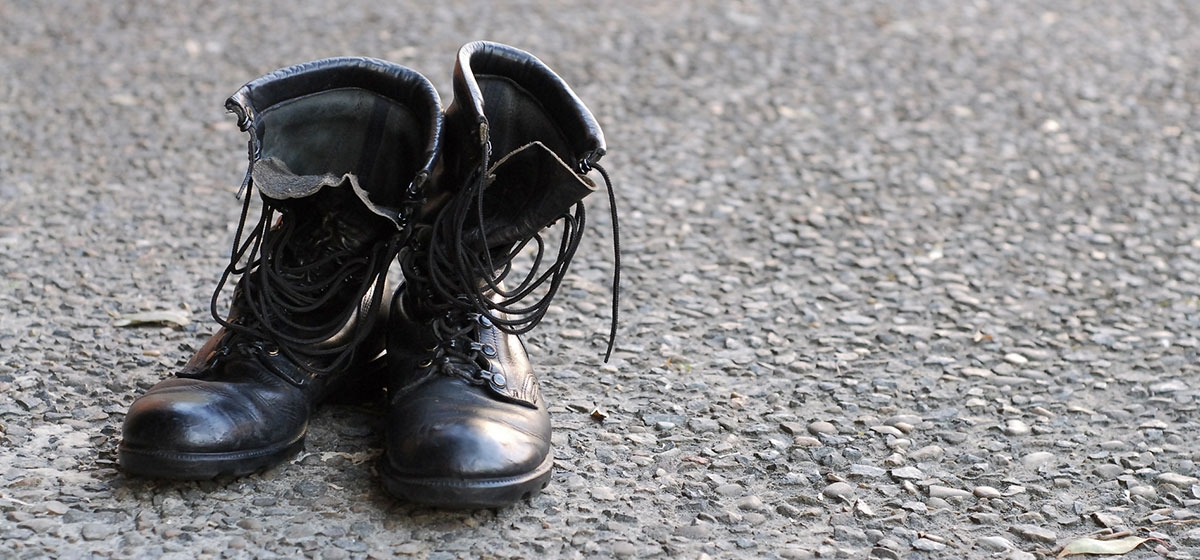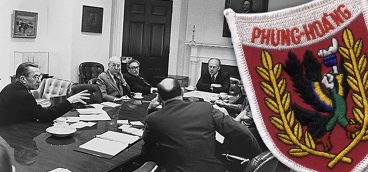Shined Shoes Can Save Your Life: The Conclusion

It was now late winter of 1971 and I was running the traffic division at the 226th MP Company at Fort Benjamin Harrison, outside Indianapolis. In those days Fort Ben was the headquarters of the Army Finance School and the location of the Army Finance Center. The building that housed the Center was the second largest military building in the world, after the Pentagon. Every soldier in the Army got paid with a check issued by the Finance Center at Fort Ben.
In addition, Fort Ben was the home of the Defense Information School, which taught soldiers how to be journalists and editors. The heavy finance and journalism focus at the base, and the light emphasis on more normal combat skills, led Fort Ben to become known as “Uncle Ben’s Rest Home.” Personally, I didn’t find it all that restful.
Fort Ben was known as a “civilian” post, due to the fact that, at least during the day, civilians vastly outnumbered soldiers. Every morning, 50,000 civilians commuted onto the base to work at the Finance Center or at one of the many businesses that served the Finance Center workers. Every evening, 50,000 civilians commuted off the base back to their homes in Indianapolis.
Thus, during the day, Fort Ben looked like any large Midwestern town, with all the amenities and problems of such places. At night Fort Ben looked like a sleepy Army post.
This posed problems for the military police. During the day we needed to operate like any civilian police force: keeping the traffic moving, writing tickets, investigating accidents, responding to emergencies, dealing with burglaries, armed robberies, rapes, and the occasional murder.
But overnight there was very little to do, since there was nobody around but a few thousand not-very-violent soldiers. (Finance guys and journalists aren’t all that creative when it comes to committing crimes—embezzlement and public inebriation were about it.)
One of the MP’s jobs was investigating traffic accidents. Minor accidents would be handled by whichever patrolman happened to be in the vicinity. But if there were injuries or fatalities, or if someone important was involved in the accident, the head of the traffic division got the call, even if he—that is, me—was off-duty at the time.
It wasn’t at all unusual to pull a 12-hour shift, go home, and then get called back to the scene of a bad accident to start the investigation. By the time I’d cleaned up the accident site, preserved the evidence, interviewed the witnesses, made my measurements and field drawings and got it all notarized, it would often be time to start my next shift.
But the fact remains that, while we worked hard at the 226th and had our fair share of challenges, we were half a world out of harm’s way – harm’s way being Vietnam, 8,500 miles on the other side of the planet. Unfortunately, not everyone was so lucky.
It was the last week in March and I was on my way to give a deposition in a lawsuit involving a traffic accident with multiple fatalities. My deputy, Canavan, called me on my car radio and said, “You driving, Sarge?”
“Yeah, why?”
“Better pull over.”
We had thought that our friends, Duncan, Johnson and Murphy, had been attached to a rifle company at Long Bình. In fact, they had since been transferred to a mechanized infantry unit that was pulling convoy security duty.
Almost everything the US Army needed in Vietnam passed through Long Bình: men, machinery, ammunition, food, medical supplies, and so on. As a result it was a common sight to see huge truck convoys, some of them 80 vehicles long, moving out of Long Bình north into the mountains or east to the coast and then up toward Huế.
Canavan told me that our friends had been part of a unit escorting a convoy up the coast, riding in armored cavalry assault vehicles (ACAV’s). Johnson was riding in the lead ACAV, while Duncan and Murphy were deployed in mid-column, slotted a bit more than halfway back.
Just west of Phan Lý on Highway 1, the column was ambushed by a North Vietnamese Army unit. The lead ACAV, with Johnson aboard, had already passed through the kill zone when the NVA opened up at point-blank range with Chinese-made 75-mm. recoilless rifles. Duncan and Murphy were just moving into the zone.
The firefight that followed was brief but intense, and when those 18 minutes were over, Duncan lay dead and Murphy lay desperately wounded. Murphy had taken a large caliber round in the thigh that nearly tore his leg off. They managed to save his life, but he lost the leg.
That evening, after the deposition, I was staring out my office window into the darkness, thinking there-but-for-the-grace-of-God-go-I kinds of thoughts. The door opened and Sergeant Hock came in. “What’s up?” he said. “You look like you got a Dear John letter.”
“No,” I said, “I was thinking about some friends of mine, Duncan and Murphy. You heard what happened?”
Duke nodded. “Rough,” he said. He’d pulled his .38 out of his holster and now began unloading it.
I sat down at my desk and said, “You know, Duke, that could easily have been me out there on Highway 1. Or Canavan.”
Duke merely shrugged. In wartime some guys get hit and some don’t. There’s no rhyme or reason to it and Duke had long ago stopped worrying about it. Besides, he was busy with his .38.
I watched Duke doing his thing for a moment and then said, “Duke, you remember that time last year when you went to the PM’s office looking for MPs and we were sitting on that bench outside the office?”
“Yeah?”
“Why’d you pick me?”
Duke flipped the cylinder shut on his .38, twirled the gun around his finger and slipped it into the holster. “Easy,” he said. “You were the only one had polished his boots. Now quit blubbering and get me the damn Incident Report.”
Next up: Central Bankers Then and Now





